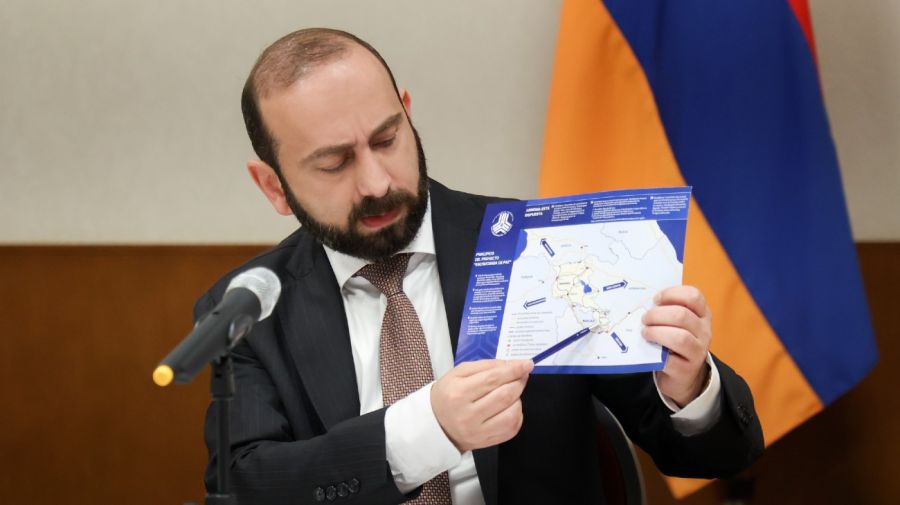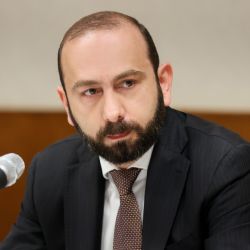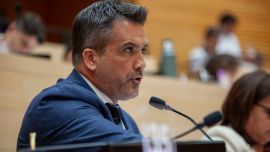Armenia’s Foreign Minister Ararat Mirzoyan says it is “impossible to hide” the growing problems in his nation's relationship with traditional ally Russia, providing further evidence of the small Caucasus nation’s ongoing foreign policy shift.
"The problems that exist in the relationship with Russia are impossible to hide," admitted Mirzoyan during a press briefing with journalists in Buenos Aires this week.
The minister’s high-profile visit to South America comes at a time of great uncertainty for Armenia, which last year lost control of the disputed Nagorno-Karabakh region to neighbouring rival Azerbaijan.
Baku recaptured the mountainous enclave from Armenians, who had controlled it for the previous three decades, in a lightning military operation.
In the aftermath of the attack, the entire Armenian population in the disputed region – numbering some 100,000 – fled Karabakh for their homeland.
Armenian leaders have accused Moscow of failing to come to its aid, especially given the presence of Russian peace-keepers in the disputed region since 2020.
Mirzoyan, 44, suggested that Russian President Vladimir Putin is searching for “new avenues” that include “cooperation” with neighbours Azerbaijan and Turkey
“According to some analysts, in the midst of the conflict with Ukraine, Russia sought new logistical avenues, and found the solution in cooperation with Azerbaijan and Turkey.
“In this scenario Karabakh would be the price to pay,” said the foreign minister.
“In Nagorno-Karabakh there was a Russian peace mission,” declared Mirzoyan, who claimed that “ethnic cleansing was carried out” after peacekeepers failed to intervene.
The disputed region had been left “completely empty” of Armenians, said the foreign minister, who revealed that just a handful of citizens remain there.
Russia, for its part, this week accused Armenia of deliberately trying to sever strained ties between the nations.
"The Armenian leadership … is deliberately pursuing a course towards the collapse of relations with the Russian Federation," Foreign Minister Sergei Lavrov said in an interview with Russian media this week.
He accused Yerevan of pushing “far-fetched pretexts” and “twisting history.”
Foreign policy shift
Mirzoyan used his time in Buenos Aires to highlight the security challenges facing his nation. His remarks provided further evidence of Yerevan’s ongoing foreign policy shift, which has seen it improve relations with Western powers such as France and the United States.
Last month, Armenia suspended its participation in the Collective Security Treaty Organisation (CSTO), a Moscow-led security alliance of several ex-Soviet states. Armenia has also formally joined the International Criminal Court (ICC), a move that means it is now obliged to arrest Putin – the subject of an ICC arrest warrant issued in March 2023 – if he sets foot on Armenian territory.
Taking questions from journalists at a hotel in Puerto Madero, the foreign minister acknowledged a rapprochement with the West and praised the European Union for its assistance on security issues.
"Currently borders are being monitored by a civilian mission of the European Union. Following this monitoring, the level of security and stability has increased significantly,” he said.
"Armenia is ready to move closer to the EU as long as the EU is ready to welcome Armenia,” added the foreign minister.

But while Mirzoyan admitted that Armenia is looking for “new instruments of cooperation," he shot down speculation the nation would join NATO, saying that cooperation with the defence alliance on security is not the same as fully signing up. Any move to join NATO would be sure to provoke Putin’s ire.
"There is no intention to join NATO on our agenda,” Mirzoyan declared.
Last week NATO Secretary General Jens Stoltenberg urged Armenia and Azerbaijan to sign a peace deal and put conflict behind them.
"Armenia and Azerbaijan have an opportunity to achieve an enduring peace," Stoltenberg said in Yerevan last week while visiting the region.
Officials on both sides of the conflict, however, seem to be wary of fully committing to peace.
Mirzoyan, for example, argued that international treaties had not been respected, citing a November 2020 ceasefire agreement that followed intense fighting in the disputed Nagorno-Karabakh region.
"At the moment we do not have that confidence that Azerbaijan has the intention to search for peace," said Mirzoyan, Armenia’s top diplomat.
"In negotiations you need commitments from both sides, otherwise peace will not be achieved.
“There are some basic issues where the positions of the two sides are very different. For example, the question of mutual recognition of borders, and that makes us think that Azerbaijan has not turned the page, does not consider the issue closed and that they have future plans for our territory,” he warned.
Nevertheless, Mirzoyan acknowledged the importance of inking an eventual deal and of normalising relations with neighbouring Turkey, a country with which it has a complicated history.
Bilateral ties
Armenia’s ties with Argentina are longstanding, with the South American nation home to one of the largest Armenian communities outside of their homeland. It is one of 34 nations worldwide that recognise the Armenian genocide of the early 20th century.
Underlining the importance of bilateral ties, last December President Vahagn Khachaturian flew to Buenos Aires to attend Javier Milei’s inauguration. The Armenian leader shared a meeting with the La Libertad Avanza leader prior to his investiture.
During his visit to Buenos Aires, Mirzoyan with his Argentine counterpart Diana Mondino, visited the City Legislature and held talks with Lower House Speaker Martín Menem. The foreign minister previously stopped in Montevideo, where he opened Armenia’s first embassy in Uruguay.
The foreign minister keenly highlighted the strength of ties between his nation and Argentina, which has a large Armenian community amongst its population.
Declaring that bilateral relations have “a longer history than 30 years” (the Republic of Armenia declared independence in 1991) and that geographical distance is not as key in the modern diplomatic age, Mirzoyan said there is a need to develop and deepen economic and political ties between the nations.
Quizzed about relations with President Milei’s government and if there had been a change in relations since the libertarian leader’s arrival in power, Mirzoyan expressed confidence and satisfaction.
“Nothing has changed,” he responded with a smile.




























Comments